Manners, Customs, Clothing
 |
 |
 |
 |
 |
 |
 |
Thanks to Urbanity- III
The Design of the Family & Life in Society
In the last article we showed how stable Catholic parents formed outstanding saints like St. Therese of the Child Jesus and St. John Bosco.
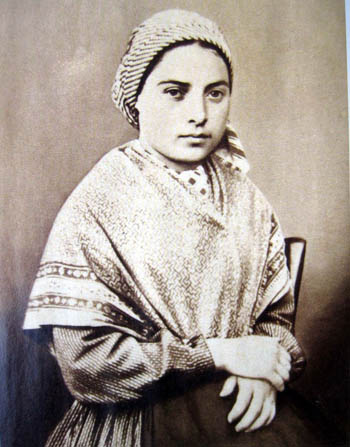
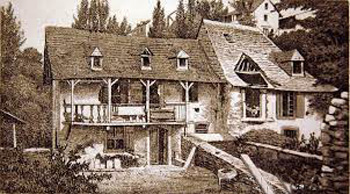 I will add now one more example: that of St. Bernadette Soubirous. In accounts of the Apparitions, Bernadette is often presented as a poor, frail and dull girl without much personality who lived a miserablist life with her family in the Cachot, an abandoned prison cell that belonged to a relative of her father. This paints a wrong picture of the reality.
I will add now one more example: that of St. Bernadette Soubirous. In accounts of the Apparitions, Bernadette is often presented as a poor, frail and dull girl without much personality who lived a miserablist life with her family in the Cachot, an abandoned prison cell that belonged to a relative of her father. This paints a wrong picture of the reality.
When she was born on January 7, 1844 at Boly Mill, she was the first child of her proud and pious parents, the miller François Soubirous and Louise Casterote, a laundress. At the time of her birth her family was relatively prosperous. Later, the Soubirous' were blessed with eight other children, and Bernadette grew up in a close-knit family where she was loved and carefully formed in good customs and piety.
Ten years of happiness in the decisive early years of her childhood gave her a stable and firm personality, clearly in evidence from her strong features and penetrating gaze. The family's descent into poverty due to a series of unfortunate matters could not erase this strong early formation. Bernadette, at 14 years old, continued to develop her lively, strong and generous character even in the family's reduced circumstances; those who knew her affirmed that she was witty and incapable of deception.
Once again, we see how the sound morals and wise doctrine of the Holy Church can mold families and form their members with moral solidity and psychological balance. This foundation, together with faith, sustained Bernadette, her parents and siblings in the sufferings they endured after the family lost their material stability that came from the trade of the father; their goods they lost; the moral stability they did not lose.
The desperate quest for material wealth and goods, social prestige or intense emotional satisfaction are not the principles to be admired and practiced if what we want is to contribute to the triumph and reign of the Sacred Hearts of Jesus and Mary in families and societies. To achieve this aim, we must return to the sound moral values and traditional doctrine of the Catholic Church that guided and preserved the Martin, Bosco and Soubirous families, despite setbacks in fortune and circumstances.
Admiration & affection
How is a Catholic family designed? The answer is masterfully provided by Prof. Plinio Correa de Oliveira in his article "Admiration and Affection in the Family."
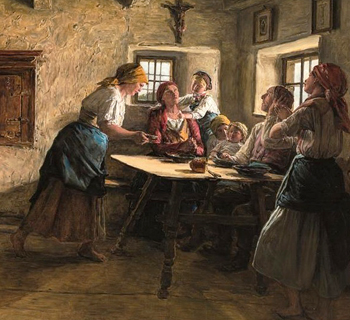 "When a family is well ordered," he notes, "it either instinctively knows, or strives to find out, its primordial light, that is, that special virtue or perfection it is called to reflect of God. Then, it admires it and struggles to foster admiration for it as much as possible. A common admiration is the best way to keep a family united. Admiration generates dedication and a sense of sacrifice for that ideal.
"When a family is well ordered," he notes, "it either instinctively knows, or strives to find out, its primordial light, that is, that special virtue or perfection it is called to reflect of God. Then, it admires it and struggles to foster admiration for it as much as possible. A common admiration is the best way to keep a family united. Admiration generates dedication and a sense of sacrifice for that ideal.
"When the father, mother, children and the extended family are all striving for the realization of an ideal, this very ideal becomes a grand guiding principle for the family. Problems become much easier to resolve. Mutual patience, respect, fidelity of the spouses, and obedience of the children are the natural consequences of this common admiration. Each member of the family is turned toward a higher religious or metaphysical goal, instead of being just turned toward himself."
Dr. Plinio goes on to point out that there are Catholic families – especially in our days – that do not built their lives upon a common admiration, but establish themselves only upon affection. And, while affection is undoubtedly a very noble sentiment, it generates better results when it is subordinate to admiration.
In short, an affection that is born from admiration for a common ideal becomes a profound, stable and long-lasting affection. The same cannot be said for a family united solely on affection and emotions. Such families tend to excuse the defects – even serious moral aberrations – of its members in the name of "love."
 This sentiment of affection born from admiration should be the element of union of the whole family. When these sentiments disappear, the family ceases to exist.
This sentiment of affection born from admiration should be the element of union of the whole family. When these sentiments disappear, the family ceases to exist.
This explains the important role of the mother in the home for it is her particular role to provide affection and nurture her children. When the mother leaves the home to enter the workplace, the affection dies out like the flame that is extinguished in the hearth of the home.
When the woman leaves the home to enter the workplace, Pope Pius XII teaches, "the atmosphere of the home cools, the family circle practically ceases to exist ... and the center of daily life will be found elsewhere for her husband, for the wife herself and for the children." (Allocution to newly-weds of February 25, 1943)
The strong internal affinity that exists in a well-established family also gives it a strong unity. A very united family teaches lessons by communicating stories of what happened in its past. Thus it transmits its history and way of being from one generation to another in an oral tradition.
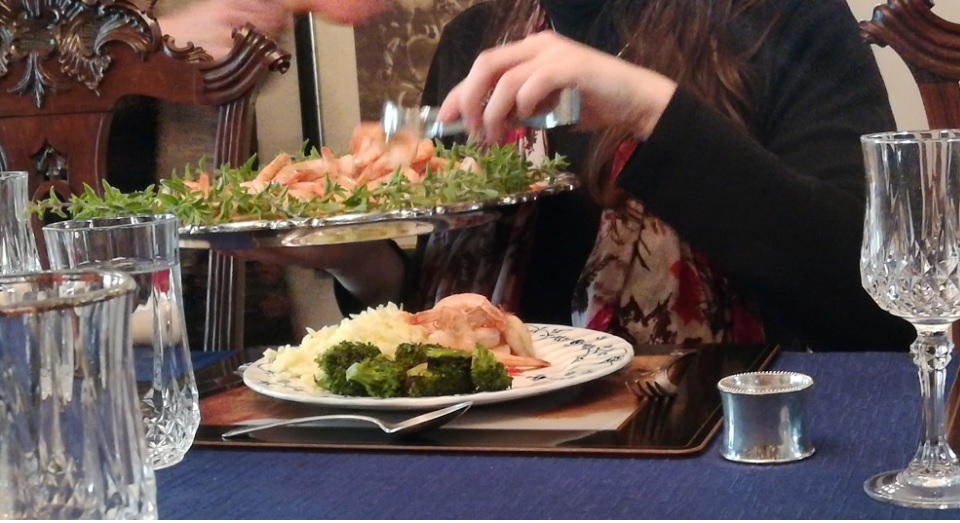 What the family is actually transmitting is not just facts and information, but concrete principles of living wisdom. Its stories are veritable parables that implicitly give lessons and form the family.
What the family is actually transmitting is not just facts and information, but concrete principles of living wisdom. Its stories are veritable parables that implicitly give lessons and form the family.
This unity of the ensemble- based on long traditions and stories of the past contribute toward forming a strong internal affinity with an intense affection.
The Wedding of Cana
The model ideal of the family undoubtedly is the Sacred Family: It is the model to follow. We realize the importance of the family at the Wedding of Cana, when a new family was integrated into society.
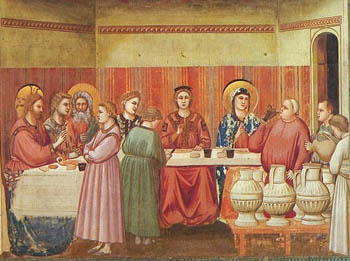 It is wonderful to think that Our Lord's first public miracle was made at Our Lady's request and that it took place at a family social event, a wedding to which they had been invited. Our Lord transformed the water into wine and gave this gift to the bride and groom, which made them appear as splendid hosts. Thanks to this miracle, they were able to offer their guests the best wine ever served in History.
It is wonderful to think that Our Lord's first public miracle was made at Our Lady's request and that it took place at a family social event, a wedding to which they had been invited. Our Lord transformed the water into wine and gave this gift to the bride and groom, which made them appear as splendid hosts. Thanks to this miracle, they were able to offer their guests the best wine ever served in History.
Anne Catherine Emmerick recounts the effects that this wine produced on the guests at the Wedding of Cana:
"I have seen that as everyone was tasting the wine, it was as if their feelings changed, not just from admiration for the miracle but also because of the effect of the wine itself. ... They received an internal strength and a salutary change in their affections. All His disciples, relatives and everyone present were now convinced of His power, dignity and supernatural mission."
The love of God orders the soul, the mind and customs. It bestows a calmness and deep serenity and, consequently, the ability to transmit goodness to our peers. This means that each person, by reflecting in himself the divine gifts, participates in some way in the divine kingship: He is a king, she is a queen, and thus know how to treat others with a certain regality and benevolence. This is one definition of what a host is.
We see, then, that the affection and amiability inside a sound Catholic family are transmitted naturally in their relationship with other family members and friends in social situations outside the home.
To be continued

Posted June 3, 2022

A strong & stable personality developed in her early years in the family home near the mill, below

When she was born on January 7, 1844 at Boly Mill, she was the first child of her proud and pious parents, the miller François Soubirous and Louise Casterote, a laundress. At the time of her birth her family was relatively prosperous. Later, the Soubirous' were blessed with eight other children, and Bernadette grew up in a close-knit family where she was loved and carefully formed in good customs and piety.
Ten years of happiness in the decisive early years of her childhood gave her a stable and firm personality, clearly in evidence from her strong features and penetrating gaze. The family's descent into poverty due to a series of unfortunate matters could not erase this strong early formation. Bernadette, at 14 years old, continued to develop her lively, strong and generous character even in the family's reduced circumstances; those who knew her affirmed that she was witty and incapable of deception.
Once again, we see how the sound morals and wise doctrine of the Holy Church can mold families and form their members with moral solidity and psychological balance. This foundation, together with faith, sustained Bernadette, her parents and siblings in the sufferings they endured after the family lost their material stability that came from the trade of the father; their goods they lost; the moral stability they did not lose.
The desperate quest for material wealth and goods, social prestige or intense emotional satisfaction are not the principles to be admired and practiced if what we want is to contribute to the triumph and reign of the Sacred Hearts of Jesus and Mary in families and societies. To achieve this aim, we must return to the sound moral values and traditional doctrine of the Catholic Church that guided and preserved the Martin, Bosco and Soubirous families, despite setbacks in fortune and circumstances.
Admiration & affection
How is a Catholic family designed? The answer is masterfully provided by Prof. Plinio Correa de Oliveira in his article "Admiration and Affection in the Family."

The natural convivium of a family
gives warmth & purpose to life
"When the father, mother, children and the extended family are all striving for the realization of an ideal, this very ideal becomes a grand guiding principle for the family. Problems become much easier to resolve. Mutual patience, respect, fidelity of the spouses, and obedience of the children are the natural consequences of this common admiration. Each member of the family is turned toward a higher religious or metaphysical goal, instead of being just turned toward himself."
Dr. Plinio goes on to point out that there are Catholic families – especially in our days – that do not built their lives upon a common admiration, but establish themselves only upon affection. And, while affection is undoubtedly a very noble sentiment, it generates better results when it is subordinate to admiration.
In short, an affection that is born from admiration for a common ideal becomes a profound, stable and long-lasting affection. The same cannot be said for a family united solely on affection and emotions. Such families tend to excuse the defects – even serious moral aberrations – of its members in the name of "love."

The modern family: fighting & vulgarity
instead of admiration & affection
This explains the important role of the mother in the home for it is her particular role to provide affection and nurture her children. When the mother leaves the home to enter the workplace, the affection dies out like the flame that is extinguished in the hearth of the home.
When the woman leaves the home to enter the workplace, Pope Pius XII teaches, "the atmosphere of the home cools, the family circle practically ceases to exist ... and the center of daily life will be found elsewhere for her husband, for the wife herself and for the children." (Allocution to newly-weds of February 25, 1943)
The strong internal affinity that exists in a well-established family also gives it a strong unity. A very united family teaches lessons by communicating stories of what happened in its past. Thus it transmits its history and way of being from one generation to another in an oral tradition.

A family should strive for an ideal even at the table
This unity of the ensemble- based on long traditions and stories of the past contribute toward forming a strong internal affinity with an intense affection.
The Wedding of Cana
The model ideal of the family undoubtedly is the Sacred Family: It is the model to follow. We realize the importance of the family at the Wedding of Cana, when a new family was integrated into society.

Our Lord made His first miracle
at a family social occasion
Anne Catherine Emmerick recounts the effects that this wine produced on the guests at the Wedding of Cana:
"I have seen that as everyone was tasting the wine, it was as if their feelings changed, not just from admiration for the miracle but also because of the effect of the wine itself. ... They received an internal strength and a salutary change in their affections. All His disciples, relatives and everyone present were now convinced of His power, dignity and supernatural mission."
The love of God orders the soul, the mind and customs. It bestows a calmness and deep serenity and, consequently, the ability to transmit goodness to our peers. This means that each person, by reflecting in himself the divine gifts, participates in some way in the divine kingship: He is a king, she is a queen, and thus know how to treat others with a certain regality and benevolence. This is one definition of what a host is.
We see, then, that the affection and amiability inside a sound Catholic family are transmitted naturally in their relationship with other family members and friends in social situations outside the home.
To be continued

Posted June 3, 2022
______________________
______________________








